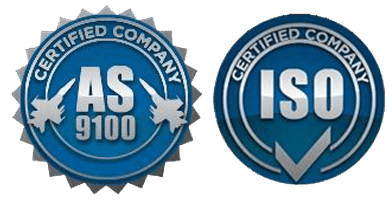Warner Brothers Foundry Company is AS9100 certified and ISO 9001 compliant.
Aluminum manufacturing materials have played a significant role in the aerospace industry over the years. Aluminum alloys are perfect in aerospace applications because they are lightweight and strong. Cast aluminum is approximately one-third the weight of steel, allowing an aircraft to transport more weight at higher fuel efficiencies.
Additionally, aluminum’s high resistance to corrosion ensures the safety of the aircraft and its passengers.
Sand Casting Metals in Aerospace
The frames of typical modern aircraft consist primarily of aluminum. Aluminum alloys are the preferred choice for the wing, fuselage and other supporting structures of both commercial and military aircraft. Structural components of current United States Navy aircraft contain high amounts of aluminum alloys.
Aluminum casting technology offers the aerospace industry the ability to incorporate new design concepts, enjoy lower manufacturing costs and utilize complex shapes and sizes. Sand casting has played a vital role in this field, especially with the manufacturing of larger-sized components.
Since the launch of Sputnik a half-century ago, aluminum has been the material of choice for various space structures. Because aluminum can withstand stress during launch and operation, Skylab, the space shuttles, Apollo spacecraft and the International Space Station all used this metal alloy to some degree. Aluminum properties consistently exceed other metals in mechanical stability, reduced weight and thermal management.
NASA uses cast aluminum to produce various mechanical parts because of its strength, durability and weight efficiency. Some examples include:
- Aluminum wheels.
- Control arms.
- Cross members.
- Steering knuckles.
- Brake calipers.
Benefits of Cast Metals in Aerospace
Sand casting is among the most popular processes manufacturers use to fabricate the metal components used in aerospace. Sand casting involves pouring molten metal into a mold constructed from condensed sand. The mold forms the metal’s shape and size as it cools and hardens. Once the metal cools, the manufacturer separates the mold to reveal the shaped metal.
Several benefits of using aluminum alloy sand castings in aerospace are:
- High strength-to-weight ratios: Aluminum’s structural integrity allows it to replace other heavier metals without sacrificing strength.
- Outstanding chemical stability: Cast aluminum is one of the most difficult metals to alter chemically.
- Excellent corrosion resistance: Aluminum is especially valuable for aircraft operating in environments susceptible to corrosion.
- Resistance to high temperatures: This material holds up in high temperatures compared to most metals.
- Superior thermal and electrical conductivity: Aluminum conserves vast amounts of energy with its outstanding conductivity rates.
- Smooth surface finish: This feature aids in resistance and allows for easy modification of manufactured components.
Other elements like silicon, manganese, copper, zinc or magnesium typically pair with aluminum to add more strength. Alloyed metals can also gain strength by cold working. Additionally, separate heat treatment steps can improve an alloy’s level of hardness.
Choose Warner Brothers Foundry Company as Your Trusted Supplier
With over 65 years of experience, Warner Brothers Foundry Company has earned its reputation as an esteemed aerospace casting foundry throughout Michigan and surrounding states. Whether you require aluminum castings for production or prototypes, we’re here to serve all your needs. To learn more, call us at 586-773-0858 or contact us online today.
Get Started Today
Whether you need sand casting for a prototype or for production, there is a solution for you at Warner Bros Foundry.


